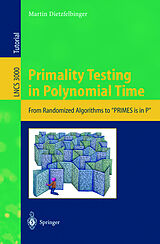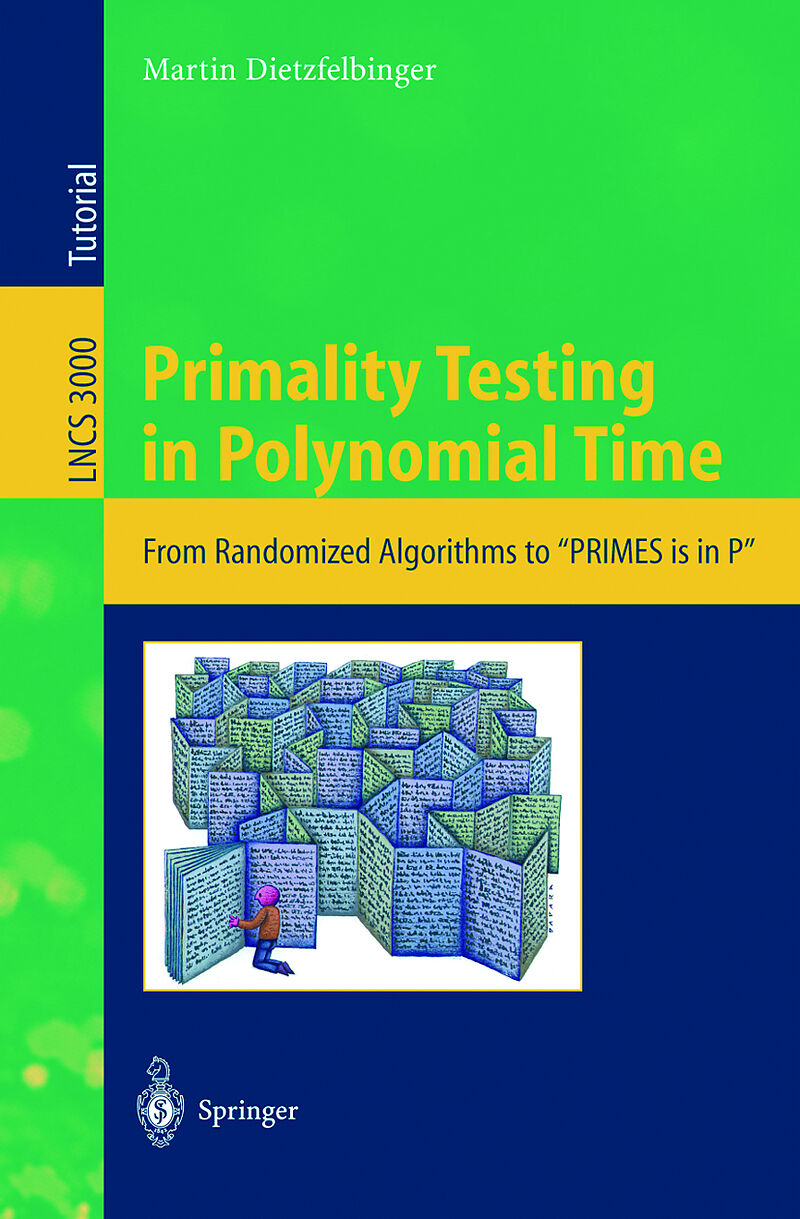Primality Testing in Polynomial Time
Einband:
Kartonierter Einband
EAN:
9783540403449
Untertitel:
From Randomized Algorithms to "PRIMES Is in P"
Genre:
Informatik
Autor:
Martin Dietzfelbinger
Herausgeber:
Springer Berlin Heidelberg
Auflage:
2004
Anzahl Seiten:
164
Erscheinungsdatum:
29.06.2004
ISBN:
3540403442
A self-contained treatment of theoretically and practically important efficient algorithms for the primality problem, covering the randomized algorithms by Solovay-Strassen and Miller-Rabin from the late 1970s as well as the recent deterministic algorithm of Agrawal, Kayal, and Saxena. The volume is written for students of computer science, in particular those with a special interest in cryptology, and students of mathematics. The text may be used as a supplement for courses or for self-study.
Describes the new deterministic polynomial time primality test (Agrawal/Kayal/Saxena) with complete analysis in a consolidated way Includes supplementary material: sn.pub/extras
Autorentext
Univ.-Prof. Dr.(USA) Martin Dietzfelbinger (b. 1956) studied Mathematics in Munich and earned his Ph.D. from the University of Illinois at Chicago. In 1992, he obtained his Habilitation at the Universität Paderborn with a thesis on randomized algorithms; in the same year he became a professor of computer science at the Universität Dortmund. Since 1998, he holds the chair for Complexity Theory and Efficient Algorithms at the Faculty of Computer Science and Automation of the Technische Universität Ilmenau, Germany. His main research interests are in complexity theory and data structures.
Klappentext
On August 6, 2002,a paper with the title PRIMES is in P , by M. Agrawal, N. Kayal, and N. Saxena, appeared on the website of the Indian Institute of Technology at Kanpur, India. In this paper it was shown that the primality problem hasädeterministic algorithm that runs in polynomial time . Finding out whether a given number n is a prime or not is a problem that was formulated in ancient times, and has caught the interest of mathema- ciansagainandagainfor centuries. Onlyinthe 20thcentury,with theadvent of cryptographic systems that actually used large prime numbers, did it turn out to be of practical importance to be able to distinguish prime numbers and composite numbers of signi?cant size. Readily, algorithms were provided that solved the problem very e?ciently and satisfactorily for all practical purposes, and provably enjoyed a time bound polynomial in the number of digits needed to write down the input number n. The only drawback of these algorithms is that they use randomization that means the computer that carries out the algorithm performs random experiments, and there is a slight chance that the outcome might be wrong, or that the running time might not be polynomial. To ?nd an algorithmthat gets by without rand- ness, solves the problem error-free, and has polynomial running time had been an eminent open problem in complexity theory for decades when the paper by Agrawal, Kayal, and Saxena hit the web.
Inhalt
1. Introduction: Efficient Primality Testing.- 2. Algorithms for Numbers and Their Complexity.- 3. Fundamentals from Number Theory.- 4. Basics from Algebra: Groups, Rings, and Fields.- 5. The Miller-Rabin Test.- 6. The Solovay-Strassen Test.- 7. More Algebra: Polynomials and Fields.- 8. Deterministic Primality Testing in Polynomial Time.- A. Appendix.

Leider konnten wir für diesen Artikel keine Preise ermitteln ...
billigbuch.ch sucht jetzt für Sie die besten Angebote ...
Die aktuellen Verkaufspreise von 5 Onlineshops werden in Realtime abgefragt.
Sie können das gewünschte Produkt anschliessend direkt beim Anbieter Ihrer Wahl bestellen.
Loading...
Die aktuellen Verkaufspreise von 5 Onlineshops werden in Realtime abgefragt.
Sie können das gewünschte Produkt anschliessend direkt beim Anbieter Ihrer Wahl bestellen.
| # | Onlineshop | Preis CHF | Versand CHF | Total CHF | ||
|---|---|---|---|---|---|---|
| 1 | Seller | 0.00 | 0.00 | 0.00 |
